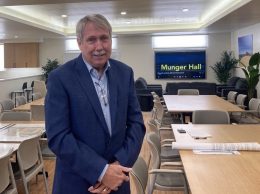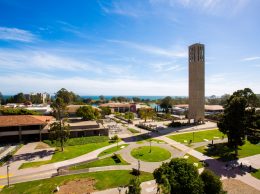Transphorm hiring heats up
Goleta-based energy efficiency firm Transphorm has broken the 100-employee mark and set its sights on markets that could save four times the electricity consumed by New York City.
The company, a UC Santa Barbara spinout headed by electrical engineering professor Umesh Mishra and business partner Primit Parikh, laid out the company’s growth and plans at the Central Coast MIT Enterprise Forum on May 16 in Santa Barbara. Transphorm makes electronic components that can vastly reduce waste heat in most devices and has raised $63 million from investors such as Google Ventures and one of George Soros’ funds.
To explain the problem, Mishra pointed to the example of a light switch. It mechanically cuts off electricity and doesn’t leak any current. He compared that with a dimmer switch, which passes a tiny amount of current even when it’s in the “off” position. A dimmer will feel slightly hot to the touch.
“Electricity is not hot — heat is hot,” he said. “Waste is hot.”
In electronic devices, a lot of on-off switching is needed to take the kind of power the grid supplies and turn it into the kind of power that devices need. Today’s switches are made of silicon and are like a dimmer — they’re leaky and waste a lot of electricity as heat. Transphorm makes its products out of gallium nitride, which is much more like an on-off switch. “Silicon, which has served us so well for the past 40 years, is maxed out. It has reached is physical limits,” Mishra said.
One major application is industrial motors. Mishra said that about 51 percent of electricity in America is consumed by electric motors. Transphorm’s chips can reduce the amount of power those motors need by about 207 terrawatt hours per year. By comparison, New York City consumes about 50 terawatt hours per year.
“What we’ve done is convert the conversation from what is impossible to what is possible,” Mishra said.
Also speaking at the event was Frank Foster, a venture capitalist with the DFJ Frontier Fund, which handles Draper Fisher Jurvetson’s investments outside of Silicon Valley. He said Transphorm’s ability to take technology from UCSB labs and turn it into products that companies can use right away was impressive, especially since public support for turning science into commerce is dwindling. “The federal government has become an unreliable partner,” he said.
Rod Alferness, the new dean of the College of Engineering at UCSB, outlined all the projects that the university and its Institute for Energy Efficiency are tackling. The college and institute recently received $50 million from Oracle Corp. Chairman and UCSB alumnus Jeff Henley. Alfernes said reducing energy use is one of the premier technological challenges of the era.
“What most people miss is that we waste more energy than we use,” he said. “In the U.S., we are less efficient today in the use of energy than we were 50 years ago.”











